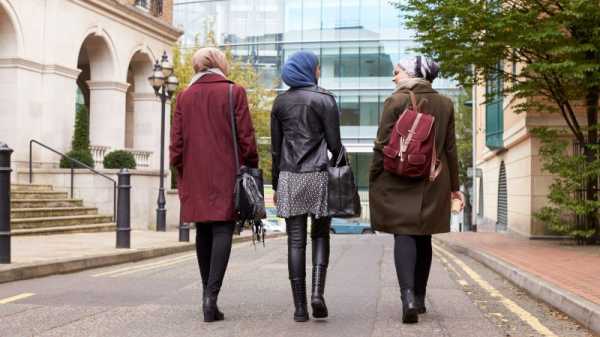
Muslim women who wear headscarves are particularly affected by discrimination and exclusion in Germany, a report found, though not everyone in the governing coalition is in favour of reforming anti-discrimination laws.
Read the original German article here.
After Sinti and Roma, Muslims are the least accepted minorities in Germany, the latest situation report of the government’s Anti-Racism Commissioner, Reem Alabali-Radovan concluded.
Since headscarves stand out as a religious symbol, Muslim women in particular experience discrimination – be it in everyday life, when looking for a place to live or on the labour market.
To counteract this, the coalition of Chancellor Olaf Scholz’s Social Democratic SPD, the Greens and the liberal FDP strengthened the country’s Anti-Discrimination Agency by appointing Ferda Ataman as the first Independent Federal Commissioner for Anti-Discrimination.
According to Ataman, however, the governing parties also promised an amendment simplifying the very complicated General Equal Treatment Act known as AGG in Germany to make it easier for those affected to defend themselves against discrimination.
“The deadlines victims have to take legal action against discrimination are way too short at eight weeks,” Ataman told EURACTIV. Moreover, those affected would bear the risk of litigation alone.
“Yet it is they themselves who have experienced discrimination and now often have to take action against their own employer,” Ataman added.
In 2016, an expert evaluation called for the AGG to be amended.
Associations’ right to sue
Like Ataman, social-democratic Bundestag member Josephine Ortleb believes associations should have the right to sue on such matters.
“Unfortunately, we could not agree on this in the coalition negotiations at the federal level,” she told EURACTIV. The right of associations to sue would enable anti-discrimination associations to take legal action against violations of the equal treatment law.
On the side of the Greens, Misbah Khan, a member of the Bundestag’s Committee on Internal Affairs, also believes that reform and the right for associations to sue in particular are long overdue.
“Discrimination and racism are a structural and societal problem,” she told EURACTIV.
But introducing this into law has so far failed due to the FDP being sceptical about the idea.
“We are fundamentally sceptical about collective action instruments. We want to empower and support people to stand up for their own rights,” Katrin Helling-Plahr, MEP and legal policy spokesperson of the FDP parliamentary group, told EURACTIV.
“We, as a coalition, have undertaken to evaluate the AGG in this legislative period,” she continued.
Headscarves make the job search difficult
Muslim women wearing headscarves are finding it particularly difficult to gain access to the labour market, a study from 2016 for which 1,500 fictitious job applications were sent out, shows.
According to its results, women with headscarves and Turkish names had to apply four times as often as equally qualified women with typical German names without headscarves to be invited for an interview. For jobs requiring higher qualifications, they had to apply up to eight times more often.
Asmaa El Idrissi, the city of Bochum’s anti-discrimination and diversity officer, experienced something similar before she found her current job.
“Out of 120 applications, I was invited to a maximum of 10 interviews, even though I fit the jobs like a glove,” she told EURACTIV.
“The higher the position you apply for, the higher the discrimination,” she added.
El Idrissi used to head the anti-discrimination network in Hesse, where she experienced “an unbelievable number” of cases where Muslim women were not even invited to view flats. “There, the foreign-sounding name is already decisive,” she said.
According to Ataman, women should seek advice in this case and not tolerate discrimination. “Wearing a headscarf represents a personal, religious commitment – and we should accept that,” she stressed.
Need for reform
To reinforce safeguards against discrimination, El Idrissi, like Alabali-Radovan in her situation report, say that federal states must also step in to pass laws in areas in which the federal government has no competence. Berlin is the first state to have introduced a state anti-discrimination law in 2020.
El Idrissi however welcomes the progress that has been made in combating discrimination, especially in the social and care sectors, under the current government.
“There is better pay and there are training programmes that are really more open-minded,” he said, noting that local governments are also more present than before.
“Germany is in the opening phase, but I have the impression that it has regressed again in recent years,” she said, referring to the Halle and Hanau shootings in 2019 and 2020 respectively, which were fuelled by racial hatred.
UK leading the pack
Looking at other countries, El Idrissi cited the UK as a positive example, where the understanding of minorities is “completely different” than in Germany.
“There, even in the highest positions, there are women who wear headscarves and have a chance,” she said about the country from which she says Germany “can learn a lot from”.
Indeed, in May 2020, Raffia Arshad became the first headscarf-wearing female judge in the UK, while female police officers from North Yorkshire worked on a headscarf design that can be worn as part of the police uniform.
According to El Idrissi, both open discourse and representation are very important to change the social perception of Muslim women with headscarves in Germany – which, according to the 2020 Migrant Integration Policy Index (MIPEX) report, does not provide long-term security for non-EU migrants and has one the weakest anti-discrimination protections among the states surveyed.
“External features – just as they serve to convey negative images – can also contribute to changing perceptions of women wearing headscarves once they are seen in any position,” she added.
[Edited by Oliver Noyan/Nathalie Weatherald]
Source: euractiv.com



